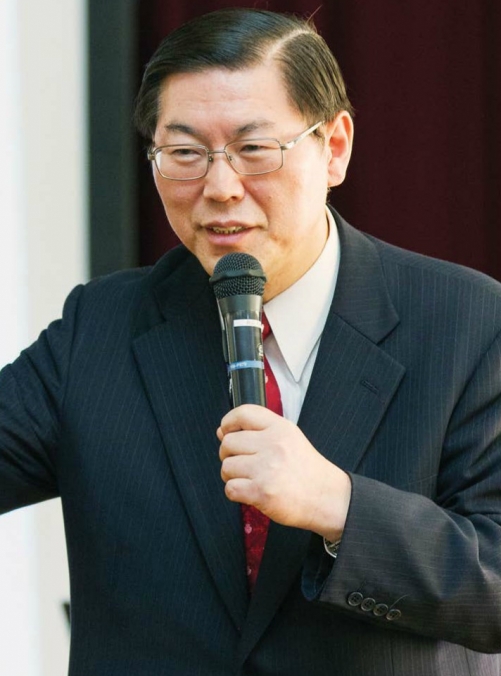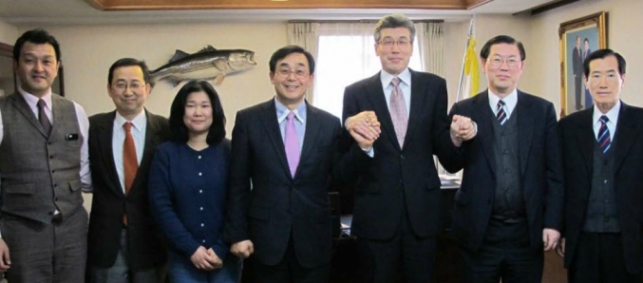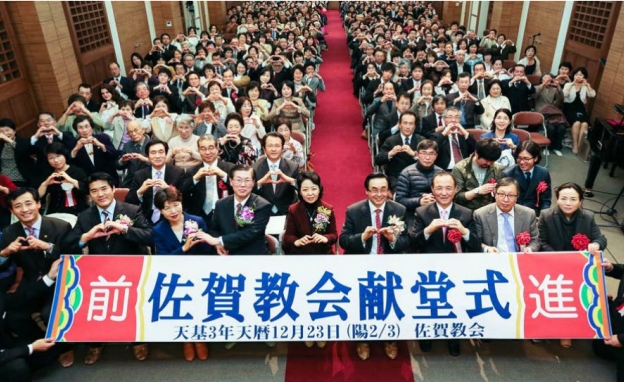![]()
The Words of the Tokuno Family
|
|
The Words of the Tokuno Family |

Rev.
Tokuno is a stalwart member. He led CARP-Japan for many years. After
graduating UTS, Father made him district leader of West Africa. He
became the regional president of Africa. He was then assigned to
China as a special missionary. He was president of the Northeast
Region and he has been national leader of Japan twice.
Question: In Mr. Goto's trial I understand that Mr. Miamura, the so-called deprogrammer, lost. But what was the name of the offense? What did the court say he was guilty of?
So far, whenever we sued and reported to the Justice Ministry and court that so many members, young members, had been kidnapped, lost their freedom and were confined in a closed room unable to leave, even chained up -- the police, the courts and the Justice Ministry always rejected it. Just six months ago, we were rejected in another court case about a kidnapping issue. This time, we lost the criminal case; so we applied to the civil court. Fortunately, for the first time, the court determined, as you know, that Miyamura Takashi is a criminal. He committed a crime. He lost the suit.
Question: What did they call his crime?
He was guilty of kidnapping. This was the first time that the judge recognized that this was the crime, kidnapping.
The "deprogrammers" devastate human rights. Always they had made excuses: This is just a meeting, consulting. We just dosed off the space, we did not kidnap anyone.
They always just explained it. Unbelievable! The judge always said, okay; this is just consulting involving parents and children. Our members are always "children." And the deprogrammers, often a Christian pastor, utilized the parents and behaved as kidnappers.
The kidnapper always stays in the background. Miyamura Takashi is a famous "deprogrammer." He persuaded the parents. This Mr. Takashi is a very bad guy. But of course we have to love him, forgive our enemy.
Question: Did the court recognize the parents' involvement?
Yes, for the first time, it included family members. In the Goto case, it was the older brother, the older brother's wife and his younger sister.
Question: Not Mr. Goto's parents?
The older brother and his wife and younger sister were involved. His father passed away while he was being confined. A Christian minister that was involved was not included in the case. Behind this pastor is a Christian association, but this association also escaped accusation. This time only Miyamura Takashi -- who has always, for the last forty years, been engaged in kidnapping issues -- was part of the suit. He has been hiding behind parents. He forced members to give up their faith, so this is a historic victory.
In the past, they said it was just a family matter. Now they recognize that the family had at least abused the rights of the child. Very seriously abused the rights, especially the right to freedom.

Left
to Right Mr. Taketuchi, Mr. Kamono (PR); Mrs. Mitsuko Antal, another
kidnapping survivor; Rev. Song the chairman of Associations of the
Federation of Blessed Family Associations, Mr. Toru Goto, Rev. Tokuni
and Mr. Ki Man Lee celebrating the victory in Mr. Goto's court case.
Question: In the Japanese court system, can they appeal?
Yes. So, we will have to fight at another stage. They have already appealed. But this was the first time that we have won. We heard that the other side was so disappointed. We lost! But this is reality they actually kidnapped people. So far, they always said that it wasn't kidnapping. We were just consulting, counseling with the parents.
In Japan, the court does not intervene especially in the relationship between parents and children. This is the tradition or common practice. In a sense, this is not very mature according to democratic values. Our democratic values are not very mature; we cannot think a lot about human rights. Human rights and religious freedom are not as well respected; we respect the humanistic relationship between parents and children more. So they say it is just counseling between the parents and child and that they are just support.
Question: There is no age at which the child is no longer a child.
It doesn't matter.
Question: That is kind of shocking.
Even though the child is twenty, thirty or forty, it doesn't matter. Sometimes, you know; in very sad cases, the husband kidnapped a wife that had joined the Unification Church. He learned she had joined the church; he spoke to a Christian pastor and then kidnapped his own wife, who might be forty or fifty. As usual, they just say that it is simply counseling between the husband and wife.
Question: But, I remember that with Mrs. Tomizawa in Tottorri, it involved lots of physical force.
[Nodding his head] In Japan you cannot intervene in this humanistic relationship within the family -- non-intervention in civil struggles.

2013
Developments -- the interior and exterior views of the Saga
prefectural church headquarters, one of three buildings purchased in
2013 with Mothers permission. Additionally, ten congregations in
Japan leased new buildings.
Question: We were aware (from a distance) of the great pain Japanese members went through when society and even the police were strongly against them. Has there been a process of healing?
It's already done. The most severe time was four years ago when I resigned. I hosted a press conference for around ten news agencies, including NHKI and major newspapers. In front of them I apologized and made a proclamation. I resigned because of problems that happened. The Unification Church itself never conducted illegal activities. This is very important. Legally, the Unification Church was registered under my name, as the leader of the Japanese church, for the national church, the entire Unification Church in Japan, the registration name was my name.
The president of the Federation of Blessed Family Associations is an honored adviser. Legally, the church was under my name. Therefore, whoever is the president of the Unification Church, for example, Mr. Kajikuri or me or Dr. Ohtsuka, or Mr. Oyamada, is registered as the leader of the Unification Church, the person legally responsible. If some serious issue had come up, I would have had to go to prison. In the worst case, I would be arrested. True Father once said, "You must be ready to go to jail, Tokuno! You must be so determined you'd even go to jail, be ready at any time to go to jail." True Father said this to me once.
At the press conference, I said that the Unification Church itself had never conducted any illegal programs, though many media outlets reported on our activities in a negative way. Also many people were harmed by some activities of Unification Church members, not the Unification Church itself.
This means that some members -- out of all the members -- made mistakes. In this sense, legally, the Unification Church never made a mistake. This is very important. Though some members made mistakes, for example, that harmed some person being witnessed to, or other outside people, which caused them some pain. In that sense, from a humanistic sense of responsibility, I must resign. Also, we must begin recognition of the importance of strict compliance from now on. After that, this kind of problem will never happen, don't worry I said that and I actually resigned.
Then, the media's negative coverage stopped. It really stopped. Also the police stopped being aggressive toward us.
As a matter of Japanese traditional sensitivity, a leader -- when, for example, problems happen in a company -- the president of the company announces his resignation, and then the media and the police don't want to attack them anymore. This is the culture there. A kind of hara-kiri. Even with hara-kiri, everyone has sympathy and feels that they don't have to criticize them anymore. It's a cultural tendency.
Question: Like the investigation into ex-president Moo Hyun Roh's family. After he killed himself, they stopped the investigation.
Yes. It is like that. It's almost the same tendency.

The
Saga church was dedicated on February 3, 2013; (in the aisle) Rev.
Yong Cheon Song and his wife Mrs. Hai Ok Lee; to her right: Rev. Eiji
Tokuno and his wife Hisae Tokuno.
Question: Did you bow, or something like that?
I bowed. I not only bowed but I practiced beforehand to get the correct angle that I should bow. I practiced in front of members before I appeared in front of the media people. Some members watched me bow and said, No, no, no. More, more, more. True Father and True Mother and Kook Jin nim heard that I practiced before bowing in front of the media. It was a very serious situation.
I expressed myself sincerely It was not a performance. If it had been just a performance many members of the media would have discerned that I was not apologizing from the bottom of my heart, that I was not sincere. If that had been the case, the media attacks would have begun again. But I did apologize from the bottom of my heart. With my utmost sincerity I bowed in front of the media people.
After my resignation, Mr. Kajikuri, even though he had very serious cancer, he risked his life, risked death. I really appreciate his tremendous sacrifice and investment. Around this tiny point, from my resignation to his inauguration, the media and the police stopped criticizing us.
We clearly mentioned the importance of compliance. We will now go forward with severe and exact policies to comply. We made that proclamation in that televised event.
Members are very out front, as we promised we would be, testifying about True Father. Using As a Peace-Loving Global Citizen, Unification Church members in Japan are testifying, so gradually troubles have disappeared.
It has been four years and we have drastically ganged our witnessing policy. In those days our reputation was bad. Because some individuals were not being honest about the church in those days, the people that were hurt would contact the police, or contact Christian ministers or contact "deprogrammers," and we had court cases. That was our reality.
Question: Thank you. Going in a different direction, could you explain how the Japanese headquarters functions and the role of consensus among the different departments?
In the Japanese headquarters, we have a directors meeting every Tuesday and a meeting of organization leaders -- WFWP, CARP, Peace Federation and other providential organizations. Reverend Song and I host it. We have a General Affairs Department, a Legal Department, a Witnessing Department and a Donations Department. We have now changed our policy. The Donations Department is under the Witnessing Department, because we dearly made a new system in which our priority is witnessing. We also have a Family Education Department and a Youth and Student Department, and the Planning Department. Mr. Ki Man Lee is the director of the Planning Department. Basically, he is in charge of all departments under my guidance and that of Rev. Song.
Question: How does consensus work in that atmosphere?
The directors will discuss some issues every morning under the direction of Mr. Lee. They discuss many things and make some tentative decisions. They report these decisions to me and to Rev. Song and then get the final decision or final permission. This is our basic system.
Question: You mentioned that you held meetings with members on your Vision 2020 goals. You also spoke about consensus at that time.
Yes over key operational policies.
Question: How did you involve the members in this?
The first meeting was among the key directors of the headquarters, then all directors discussed the goals for Vision 2020. Then all the local leaders met and discussed these goals. Next the providential organization's presidents met and discussed these goals. Younger generations met. And finally local leaders met, shared and confirmed the policies.
Question: Remarkable
In this area, Rev. Song has brought something of a Western system from Europe -- discussion and brainstorming. He sometimes emphasize that brainstorming is very important and drawing out each member's opinion and then discussing it. We do not reach complete agreement. We cannot achieve that, but the majority of the people are so satisfied.
Today, I mentioned that the top-down system is really gone and the Western members were like, Whoa! Rev. Song brought to Japan a culture of democracy that originated in Europe.
Question: You spoke earlier about Mother's tour of Japan.
True Mother visited five major cities in Japan. We prepared five wonderful rallies. At that time many Korean media figures came to Japan and members of the Japanese media came to her rallies for the first time and listened to Mother's wonderful speech. They had often asked, after Father passed away, where will the Unification Church go? Will it succeed or not? After Father passed away, everyone was so concerned because Father had such charismatic leadership. There was concern about the future of the Unification Church. The many people that attended the rallies realized thine was no reason to be concerned about the future. True Mother is here. True Mother is great!
Many congressmen attended. At three of the five rallies, congressmen gave congratulatory remarks. In Japan's case so many opposition party members were there, Christian groups and communist groups. Yet, many congressmen bravely showed up. They gave remarks in front of True Mother, in front of the media and in front of opposition party members.
Mother wrote for us, "We are united as one," and she gave so many blessings to Rev. Song and core leaders in Japan. We are united as one.